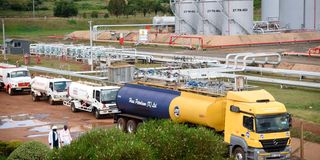
Petrol tankers at Kenya Pipeline Company’s Eldoret Depot. Uganda imports about 2.5 billion litres of petroleum products a year, with 90 per cent handled by Kenya.
On October 31, 2023, Energy and Petroleum Cabinet Secretary Davis Chirchir said the Cabinet would in its next meeting consider Uganda’s request for a waiver on licensing requirements for its state-owned oil firm. The decision was, however, delayed.
In a letter to Energy and Petroleum Regulatory Authority (Epra) Director-General Daniel Kiptoo, the minister said the Cabinet would make its decision by the end of the first week of November on granting the waiver, to licensing of the Uganda National Oil Company (Unoc).
But sources privy to the matter say powerful State House forces went ahead and directed the regulator not to grant the waiver which would allow Unoc access Kenya Pipeline Company’s (KPC) facilities.
Uganda has moved to the East African Court of Justice seeking it to compel Kenya to issue the permit and open up KPC’s facilities to Unoc.
Top bureaucrats at the Energy Ministry remain coy on the matter, declining to respond to queries. The issue threatens ties between Kenya and Uganda.
“It would be imperative for the technical teams to evaluate the logistical arrangement that will allow seamless transition of the petroleum import operations even as the licensing request by Unoc awaits consideration by Cabinet later this week,” Mr Chirchir’s letter said.
The waiver marked Unoc’s second licensing request and came two weeks after Kenya declined to issue the company the permit, triggering a spat between the two countries.
For two weeks, Epra remained silent on Unoc’s second application as the regulator caved in to State House directives.
Mr Chirchir’s letter came a month after Epra declined to issue Unoc a licence to operate locally. It said the company failed to meet a raft of requirements.
Official documents show that Epra had through an email response told Unoc that licence application was not successful after the oil marketer failed to show proof of annual sales of 6.6 million litres of fuel or ownership of five licensed retail stations.
According to the response signed by Epra Petroleum and Gas Director, Edward Kinyua, Unoc failed to show proof of owning a licensed petroleum depot in Kenya.
The rejection prompted the Ugandan Minister for Energy and Mineral Resources to write to his Kenyan counterpart on October 11, 2023, requesting him to lobby the Cabinet to waive the licensing requirements.
Epra, however, went quiet even after the Cabinet discussed the matter at its sitting on November 2, 2023, prompting Uganda to escalate the matter to the East African Court on December 28.
In the submission filed by the Ugandan Attorney-General, Kampala accuses Nairobi of placing unnecessary demands, adding that this is in breach of the East African Treaty and UN Conventions.
Uganda accuses Kenya of breaching Article 93 (c) and (d) of the East African (EAC) Treaty on maritime transport and ports.
According to the treaty, partner states shall make rational use of existing port installations.
It also compels coastal nations to cooperate with landlocked partner states and grant them easy access to ports and opportunities in maritime services.
Uganda says that it has the right to access Kenya’s maritime facilities and transit routes under the United Nations Convention on the Law of the Sea.
“Unoc found the above requirements an unnecessary hindrance...as the petroleum products in issue were wholly transit goods not destined for the Republic of Kenya,” the Ugandan Attorney-General says in the court documents.
“The Republic of Uganda...sought the intervention of the Republic of Kenya to restrain its organs of state from infringing the principles and provisions of the treaty and protocol.”
Uganda imports about 2.5 billion litres of petroleum products valued at $2 billion annually, with KPC handling at least 90 per cent of the cargo, highlighting one of the reasons for the reluctance by Nairobi to allow Unoc to use KPC systems.
Uganda signed an agreement to buy fuel from Vitol Bahrain directly from the start of this year, ending decades of reliance on the Kenyan Open Tender System and now the government-backed importation of fuel.
The decision by Uganda was silently started in February last year when Kenya was finalising talks with three Middle East oil companies to import fuel on credit.
The impasse adds to the bad blood over fuel imports that started last year when Kenya, without consulting Uganda, struck a deal with the three Gulf oil majors to supply fuel on a credit for 180 days.
Kenya’s deal with Saudi Aramco, Abu Dhabi National Oil Corporation and Emirates National Oil Company started in April 2023 and was extended to the end of December this year.
Nairobi says the deal has helped slow down the weakening of the shilling against the dollar by cutting an estimated monthly demand of $500 million that marketers needed to pay for fuel in the spot market.
But the deal prompted President Yoweri Museveni to accuse Kenyan middlemen of inflating pump prices in his country by up to 59 per cent, denying Ugandans cheaper fuel when global prices of the commodity have been on a free-fall.
Uganda has the most expensive fuel in the region, with a litre of super petrol going for $1.44 in Kampala compared to $1.37 in Kenya while diesel is retailing at $1.38 compared to $1.33 in Nairobi.
As the case unfolds at the East African Court of Justice, diplomatic experts have questioned the strength of the ties between Kampala and Nairobi, saying the fallout could have been averted through negotiations.
Uganda has also been in talks with Tanzania to have Unoc use the port of Dar es Salaam to import and transport Kampala-bound fuel.
Talks between Kampala and Dar es Salaam started in November last year amid the growing reluctance by Nairobi to license Unoc.





